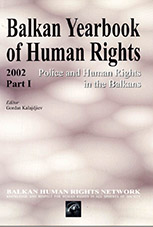Arrest in adversarial criminal procedure
Arrest in adversarial criminal procedure
Author(s): Ivo JosipovićSubject(s): Law, Constitution, Jurisprudence
Published by: Balkan Human Rights Network
Summary/Abstract: Arrest, the action that deprives an individual of liberty, represents temporary restriction of one of the most important human rights, the right to liberty. The aim of arrest in the criminal procedure, as a rule, is to prevent the flight of the suspect and facilitate the police in gathering the data relevant to the criminal procedure. Most arrests are made by the police. Therefore, the question arises about police rights (authorities), their duties in the event of arrest, and their duties while a person suspected of having committed a criminal offence (the suspect) 1 is under their authority. The answers to these questions differ from state to state, depend on historical and present social circumstances, and vary according to legal system. However, regardless of the differences in particular states, the family of democratic European states has established in respect to deprivation of liberty in criminal procedure the minimal standards which should guarantee the protection of the right to liberty and the application of the principle that citizens may only exceptionally be deprived of liberty, under conditions prescribed by law, if it is necessary to achieve the aims of the criminal procedure.
Journal: Yearbook of the Balkan Human Rights Network
- Issue Year: 2002
- Issue No: 01
- Page Range: 151-165
- Page Count: 15
- Language: English

